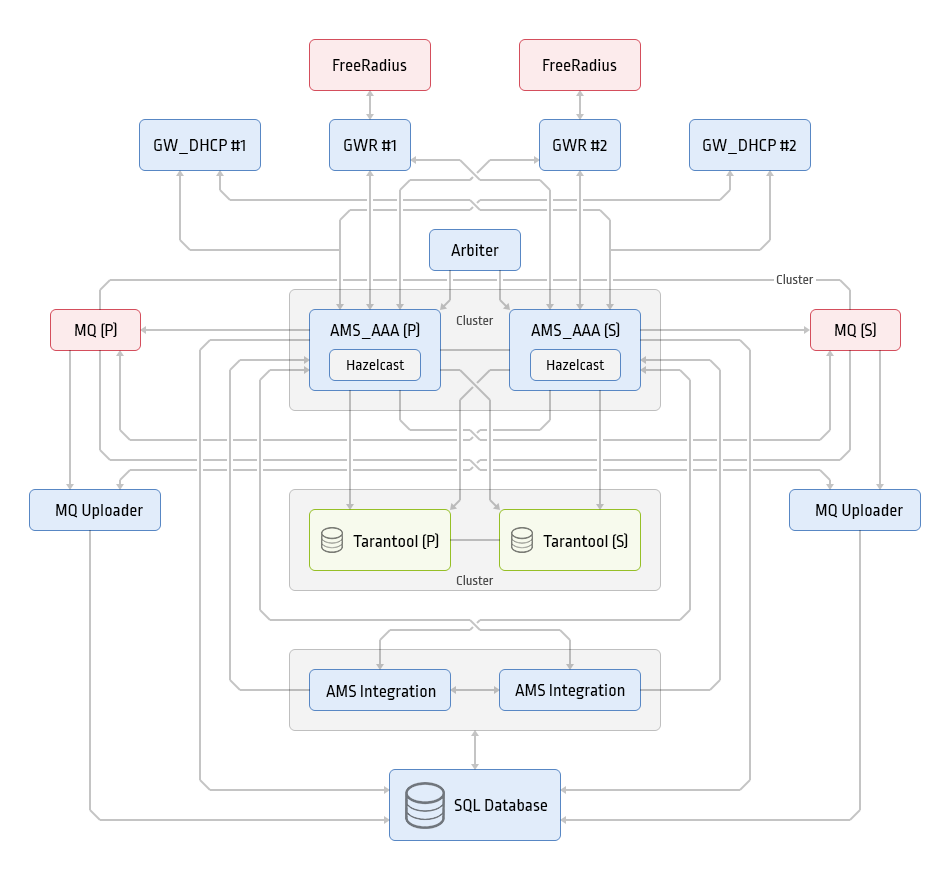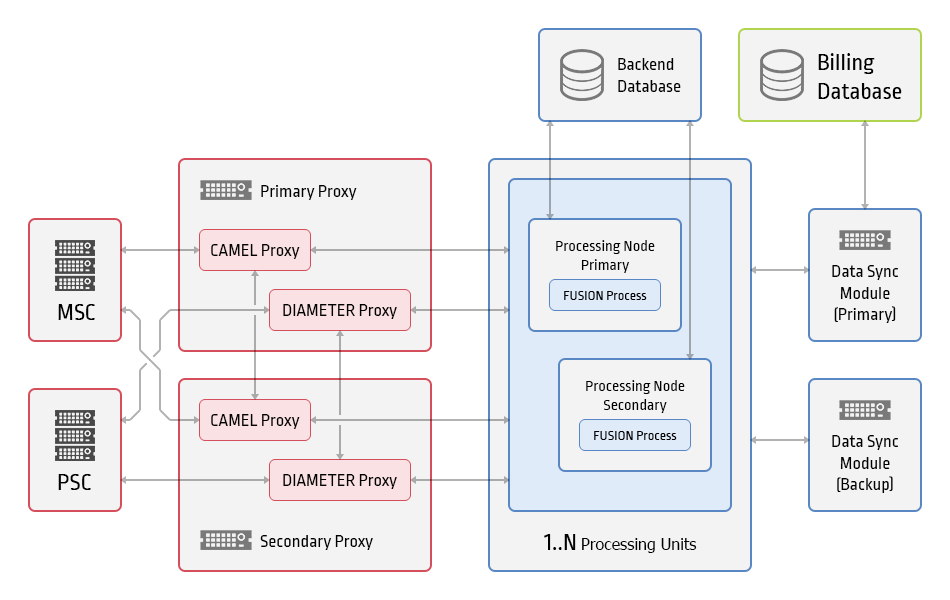Getting Started with Oracle
From the very beginning, Forward Billing used Oracle solutions as a DBMS. Considering how long ago the development of the product began, this was actually the only correct decision on the choice of the database.
Simplified technical scheme of Forward Billing (database, application server, web server, client web browser) with arrows between the elements, showing the relationship.

A long time ago in a galaxy far far away ...
Even now, after 14 years, Oracle is the main DBMS of our billing and is used to store all accounting and regulated information.
However, evolution has turned the billing system into a BSS / OSS line of 16 products that completely cover all needs of a telecom operator - from CRM and PRM to Service Provisioning and DMP. Clients serving multimillion subscriber bases appeared, the market itself changed. And using only Oracle has ceased to meet the business requirements of modern companies.
Speed and money
We are a commercial organization and it is important for us to understand who benefits from the implementation of new technologies in our products and how investments in expanding the technology stack will pay off for us.
Objectively, not all customers require tremendous performance in mission-critical systems. If there are not very many subscribers, then flexibility, manufacturability and the ability to quickly integrate with partners and bring interesting offers to the market come first. If, for example, a customer is a new virtual telecom operator with a limited list of services in its niche, he does not need the capacity to process 10 million of the base, he needs a toolkit that allows him to very quickly process the available information and make decisions in real time.
There are three main factors we look at when selecting technologies to expand our work stack and integrate into our product line:
- Technological - speed and reliability of work, current experience of use.
- Cost of ownership - purchase of licenses, personnel (including finding and hiring specialists for us, as developers, and for the client, as in-house specialists).
- Perspective - how long the technology has existed, who develops it, in which projects it is used, and how likely it is that the developer / owner of the technology will stop developing within 5 years.
Assessing these factors, we have formed for ourselves a set of Oracle, PostgreSQL, Hazelcast and Tarantool, which we are using now.
Oracle is the basis for large and important projects, long-term integral storage and processing of aggregated data.
PostgreSQL - Government-owned companies are now showing interest in using PostgreSQL. But our large clients - banks, large operators - are rather not yet ready to consider this DBMS as the main one. PostgreSQL topics are well known now, many are interested, discuss, calculate various options. For work with the public sector and with its affiliated organizations, this is undoubtedly the main option at the moment to replace Oracle.
Anecdote as a picture:

Tarantool- now used as one of the main components of Forward OSS. We plan to migrate to Tarantool in 2020-2021, as well as a couple of systems from our product line. We see a good point of growth due to the placement of the subsystem on a separate fast database. So far, not all of our customers perceive Tarantool as a rather serious technology, but here the best argument “For” is the successful results of industrial operation. So time will tell if Tarantool pays off.

Hazelcast- to grind large amounts of data on the fly and then transfer the calculation results to the billing system. We use Hazelcast in Forward Fusion, an online billing system used to provide services on a prepaid model, and in Forward PC (product catalog), a tool for developing and managing a company's marketing activities that allows you to create packages of offers in real time. Among Russian vendors, we were one of the first to start using this technology. Most of the prepaid systems operating in Russia were developed 10 years ago, they have a different technology stack and are slower and heavier than our solution. We love Hazelcast because:
- Scales well, clusters conveniently.
- , .
- . 500 . 1 .

After the scheme of the DBMS operation, let's return to the users once again - because of them we are expanding the technological stack and fooling around with various DBMSs to provide quick access to a lot of related data when calculating transactions in billing.
In general, we need to clarify here our position on the introduction of new technologies into the Forward platform. We are a commercial organization and cannot afford to spend unlimited time on continuous study and testing of all new technologies in a row, R&D resources are limited. Our task is to listen carefully to the market and our employees. If a technology that seems promising at first glance slips, an overview is made of solutions that are similar in class. We look at:
- Development cost.
- Operating cost.
- Complexity of service.
Maintaining and updating a large zoo of technologies is expensive, it is necessary to somehow standardize. It is necessary to grope for the golden mean between the desire to introduce new technologies and spending, listen to the environment so as not to miss promising technologies. Take into your stack something that has proven its reliability and is suitable for corporate clients and has great potential for solving applied problems.
On the other hand, the experience of working with foreign clients says that they expect Oracle from us. Yes, if we announce that we are additionally working with Hazelcast and Tarantool, then this can be perceived as an additional plus, but first of all - Oracle.
It was important from a perspective point of view that Tarantool was originally created for gigantic transactional loads of web portals and dynamic content. By the way, here you can read what principles we are guided by when developing interfaces “Interface for cloud services in the B2B segment: between beauty and utility” .
Now there is a market trend and a certain general whipping up of the atmosphere of leaving non-relational databases, rejection of licensing policies, use of free software, rejection of "heavy" proprietary solutions. The market, even in the person of some large companies, wants to work with free software at the procurement policy level in an attempt to save money. However, all old information systems will not be updated in the blink of an eye, they will not switch to new technologies. Therefore, we look around, we are gradually introducing new technological solutions into the platform, but we will not forget about Oracle either. Perhaps in 5 years the list of used DBMSs will be significantly updated, but in the future 2 years we do not expect any significant changes.
We try to apply new technologies first of all when launching new products or when separating some subsystems into separate solutions.
In our SaaS solutions, new DBMSs are easier to use because we have complete control over the environment. Therefore, there the process of migration to new - simpler and cheaper in operation DBMS - is going faster. The economic factor decides - no one wants to pay extra for licenses.
Tarantool & Hazelcast - Results of Expanding the Forward Telecom Technology Stack
In the process of demonstrating our solutions to clients, we can clearly observe a high responsiveness to our new products, advise customers' IT services on improving work productivity through the introduction of new technologies, and show our higher qualifications. This increases trust in communication and we are remembered from the good side.
Improving technical competencies helps us in the development of new modules for Forward Billing. For example, those that require grinding huge amounts of constantly updated data on user profiles, Next Best Offer (NBO) searches, triggering automated triggers and bonus accumulators, etc.
We believe that investments in improving the technology of the Forward platform are successful and promising, we will try to further develop the technology stack and share with you our feelings of its practical application.
If you have experience of using Tarantool and Hazelcast in telecom, billing or accounting systems, you want to share your knowledge - leave comments on the article. Thank you for attention!